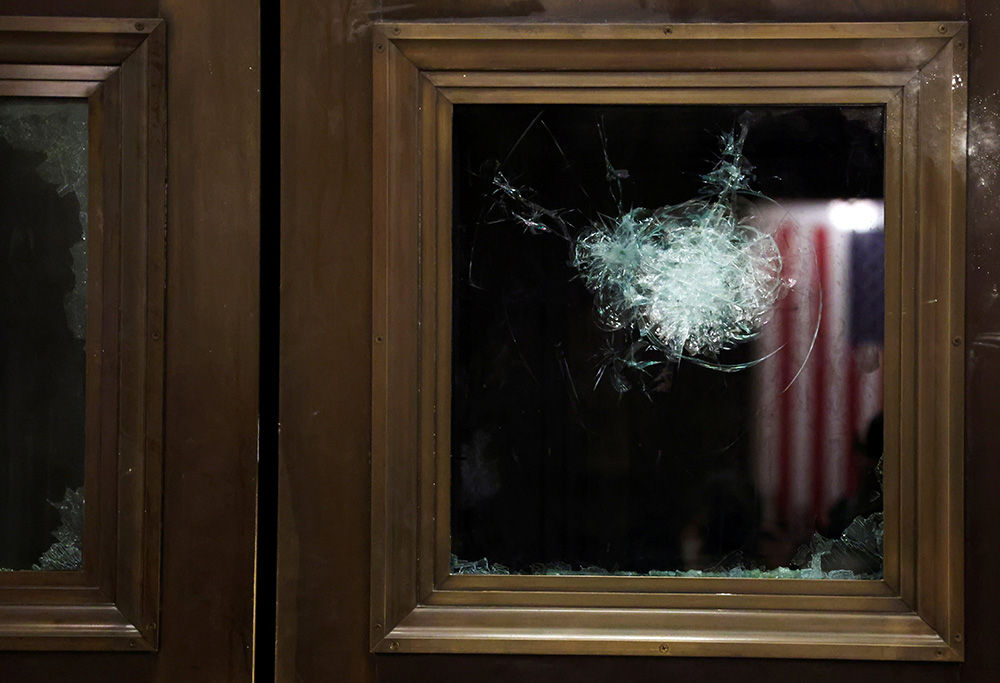
A broken window is seen in the U.S. Capitol during a joint session of Congress in Washington Jan. 7 after lawmakers reconvened to certify the Electoral College votes of the 2020 presidential election. (CNS/Reuters/Jonathan Ernst)
Every Wednesday for the last four years, I've gathered with a group of women to reflect on Scripture and to pray for our world. We pray for our neighborhood, our country, our friends, our families and our world. We share the journey, and this past Wednesday, Jan. 6, was no different.
Even though the Catholics in our group had marked Epiphany the Sunday before, any cultural Christian, adherent to the 12 days of Christmas, or parent of children in our local public schools — which close for Three Kings Day — knew that, in fact, Wednesday the sixth was Epiphany.
After reading Matthew's account of the wise men's journey, our small group listened to the words of Jan Richardson's Epiphany blessing, "For Those Who Have Far to Travel." Sitting in peaceful reflection on the past year and the gift and challenge of the journey, we were united in our diversity. Old and young, black and white, women of all different backgrounds, we shared the movements of God in our lives. This week, that meant sharing how the pandemic bore with it tragedy and grace; what promise the vaccine brought; why peace was as important as that the electoral votes be counted; and the hard-learned fact that the isolation of the last few months had as much to reveal to us about other people as it did about ourselves.
Listening to one of our elder members share, I felt my phone begin to buzz. With a swift movement of my thumb down its side, I stilled the device so I could be attentive to her sharing. What a blessing to journey together like the wise men, she reflected, to be attentive, be surprised and discover the truth and where it leads us.
Wednesday was like any other Wednesday until it wasn't.
Emerging from the meeting, I took a moment to glance at my phone. To my surprise, news alerts, not about the counting of the Electoral College votes, but about the storming of the U.S. Capitol, lit up the screen.
Suddenly, the Epiphany story was a little more real ... the journey more treacherous ... the need for truth and peace all the more pressing.
A tyrant saw a threat to his power. Filled with fear, he brought fright to the whole country. He stoked fear and incited violence. The king could not stand the truth and so he sought to rout it out. But the truth would not yield; it had come into this world in the form of a child and, vulnerable as it might be, the truth embodied in the child would persevere, in ways both paradoxical and puzzling to our concept of power.
This new king — a prince of peace — would reject violence and injustice. His power greater than that of any politician was (and is) found in steadfast, boundless love that urges reconciliation, humility and righteousness. His love, like a star in the night, draws all who can see and invites everyone to see with new eyes the promise of the truth he offers.
On the floor of the Senate Wednesday night, Sen. Cory Booker of New Jersey pointed to the deadly flaw and sadistic (and seditious) shift in thinking as he declared how people had been duped into choosing Trump over truth. This sycophantic shift was punctuated by the events on Wednesday. They gave us a moment for pause many moments too late.
Yet to quote the statement from Pax Christi USA, "Maybe today's events will serve as a moment of conversion for some; maybe this moment may serve to give pause to the worst impulses of our national character. Only time will tell. The words and actions of our elected leaders moving forward will tell the tale of what impact today's events have."
Advertisement
In the words of Chicago Archbishop Blase Cupich, "What has been unfolding at the Capitol today should shock the conscience of any patriotic American and any faithful Catholic. The eyes of the world look on in horror as we suffer this national disgrace.
"For many months we have witnessed the deliberate erosion of the norms of our system of government." That erosion has taken the sacred right of peaceful protest and desecrated it by introducing violence.
"May God's love suffuse our political life together," Cupich continues, "reminding all Americans that politics is the peaceful resolution of conflicting points of view. This is our tradition as a democratic nation — and we undermine it at our own peril."
Watching to the breaking news coverage, I struggled to hold on to the prayerful peace of my normal Wednesday. As rioters carried myriad flags up the U.S. Capitol steps without any intervention, a commentator tried to reassure the audience at home. "This is a last gasp," she said as more and more individuals ascended the steps. I am sure the phrase was meant as a reassurance, implying that this was a worrisome but passing moment — the end of days, weeks, months and years of unrest.
The phrase, though, wedged itself in with the fading peace within me: One. Last. Gasp.
This moment wasn't a blip on the screen. In a year filled with tragedy, it didn't feel like the period at the end of sentence or the last surge of a movement. It felt more like a bad dream come to life. This moment was the culmination of many predictions, the revelation of the destructive power of distrust, white supremacy and conspiracy theories. The result of hubris and hatred weaponized in the name of a tyrant.
As the space in front of the Capitol filled with people, this "last gasp" knocked the wind out of me. All I could think of were the tragic last words of Eric Garner, "I can't breathe," and the thousands of people suffering from COVID-19 in the United States who are literally gasping for breath. In an age when we are hypersensitive to signs and symptoms, what happened Wednesday is less of a "last gasp" and more a mind-blowing reminder of the division in our country and the violence, hatred and destruction that are startlingly apparent in our body politic.
As we journey forward, the soul of the nation hangs in the balance. No president will save us, no single politician can set us straight. The journey that lies ahead is ours to undertake. It means facing racism head on, holding people accountable, and seeking reconciliation. Each step has its cost, the invaluable price of truth. Charting our course will surely push us to our limits, but the work of finding our direction requires such effort.
Together, we can find our way. E Pluribus Unum.
If we can see the light, we have no other options. This is where we've arrived amid the darkness of our times. Now it is our turn to open our eyes, follow the light, and return to the soul of our country by another way.
[A Sister of St. Joseph of Philadelphia, Colleen Gibson is the author of the blog Wandering in Wonder and has been published in various periodicals, including America, Commonweal and Give Us This Day. She currently serves as coordinator of services at the Sisters of St. Joseph Neighborhood Center in Camden, New Jersey.]







